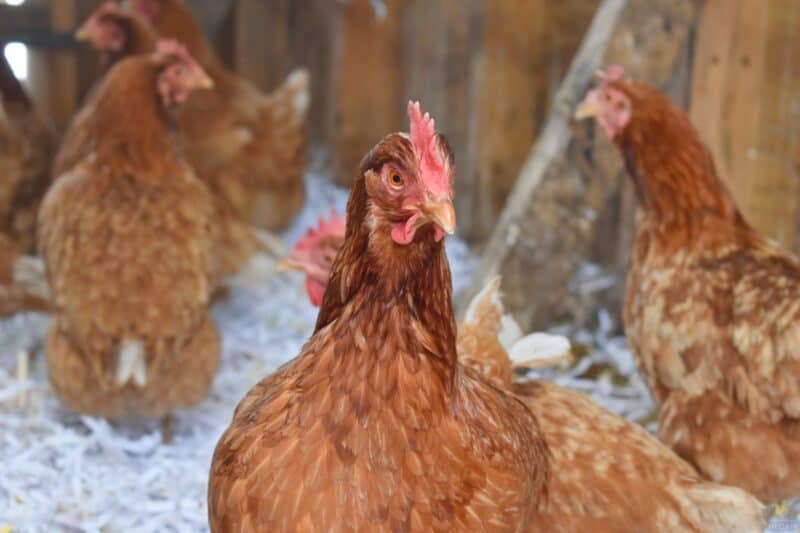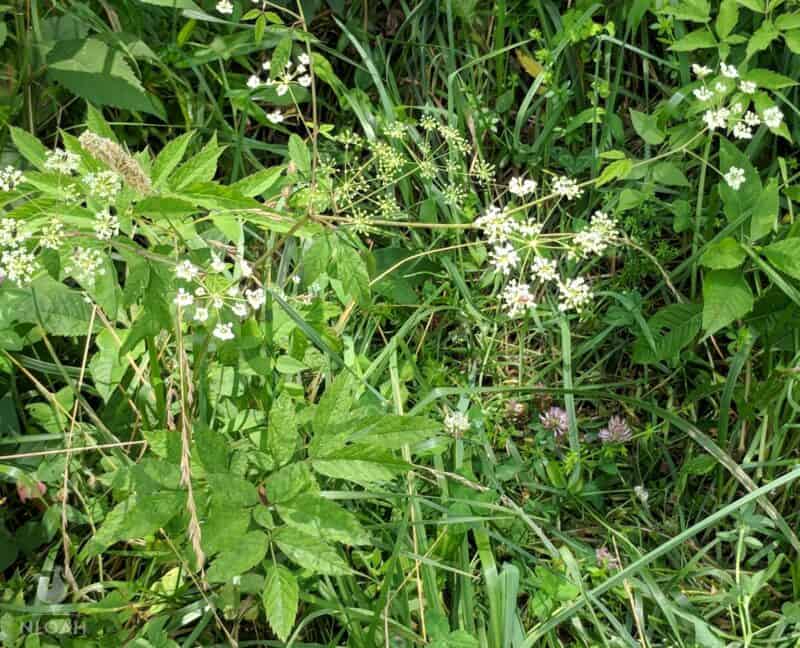Chickens can eat all kinds of things that humans and other animals would consider unpalatable, or that might even be harmful.
Some common plants make a good snack for chickens even though other animals don’t touch them.

How about something that is normally dangerous like hemlock? Can chickens eat hemlock?
No, poison hemlock is toxic and extremely deadly for chickens and they should never eat it under any circumstances. Note that all parts of hemlock contain deadly toxins, and there is no way to make it safe for eating.
Not much of a surprise there considering the reputation of this deadly plant precedes it.
Hemlock is an increasingly common plant across North America, and flourishes it quickly and unexpectedly when conditions are right so you need to know what it can do and how to deal with it.
Keep reading to learn more.
Hemlock is Deadly Poisonous for Humans and Animals, including Chickens
There’s no two ways about it. Common hemlock, also properly known as water hemlock and colloquially as poison parsley, is extremely toxic for pretty much every animal, and also for people.
Hemlock contains coniine and other alkaloids that make it extremely dangerous for mammals and many other organisms.
In fact, this stuff is so toxic it only takes between 150 and 300 mg of this stuff to reliably kill an adult human. Imagine how much less it will take to kill a chicken.
Hemlock is a particular hazard to domestic animals when it is inadvertently eaten, and livestock in particular because it is often accidentally gathered with and turned into hay for livestock feed.
Even worse, warm seasons lead to an increased concentration of the precursors of the toxin in the flesh of the plant, making them particularly deadly.
Notably, when mature and large a distinctly unpleasant odor somewhat similar to parsnip is often detected near the plant, and this older intensifies when the stems or leaves are crushed or broken.
Wherever you find it, you’ll want to get rid of hemlock and make absolutely sure that none of your animals can come into contact with it.

Can Chickens Eat Hemlock Raw?
No, raw hemlock cannot be eaten by chickens in any quantity safely.
Can Chickens Eat Hemlock Cooked?
Cooking hemlock does nothing to meaningfully reduce or neutralize the toxins present in the flesh of the plant.
All Parts of the Hemlock Plant are Highly Poisonous
Every single part of hemlock is full of deadly poison, from the flowers and the leaves to the stems and the roots.
There is no part of this deadly plant that can be safely ingested, and even the minutest amounts can have severe health consequences.
The Seeds and Roots are Most Dangerous of All
However, the concentration of toxins varies slightly from plant to plant and from species to species, but invariably it is the seeds and the roots of the plant that contain the most poison.
If, for whatever reason, your chickens should ingest hemlock seeds or any part of the root, death is highly likely.
Symptoms of Hemlock Poisoning in Chickens
Hemlock poisoning takes effect quickly, and absorbed rapidly through the lining of the digestive tract or it enters the bloodstream and begins to take effect.
Initially, heightened energy levels or excitedness are likely, but these will quickly give way to debilitating effects on the nervous system.
Symptoms will include an increased heart rate, breathing trouble, trembling or seizures, dilated pupils, lethargy and weakness and an inability to stand.
Particular indications of hemlock poisoning include a blue or pale colored comb and a musty, nasty smell on the droppings or breath of the chicken.
Even Contact with Hemlock Plants Can Be Dangerous
Saving a chicken that has been poisoned by hemlock is unlikely, so your best bet for protecting them is by controlling the plant through elimination.
However, you should know for your own sake and for the sake of your chickens that even contact with hemlock can be dangerous.
The toxins are present on the surface of the plant, and as the plant is rough handled and broken more will be brought to the surface.
The poisons can be absorbed through the skin and incidental contact with mucous membranes and other sensitive tissues can lead to more serious poisoning.
Do not let your birds go anywhere near the hemlock plant, and you should wear sturdy, non-absorbent gloves anytime you are dealing with it.
Hemlock is Particularly Dangerous for Baby Chicks
One more thing to keep in mind is the danger that hemlock poses to baby chicks.
Hemlock is deadly enough for adult chickens, but it is far worse for chicks that lack a fully developed set of organs and digestive tract, and lack the body mass to offset the toxin.
Even the most incidental contact or ingestion of coniine will likely spell death for a check, so if you allow chicks to roam and range with their parents you must take extra precautions to ensure that all hemlock is eradicated from your property, or at least anywhere that your chickens have a chance of reaching.
To do otherwise will likely mean death for the poor bird.
Tom has lived and worked on farms and homesteads from the Carolinas to Kentucky and beyond. He is passionate about helping people prepare for tough times by embracing lifestyles of self-sufficiency.
